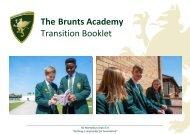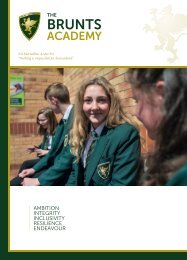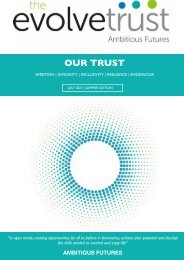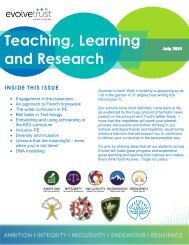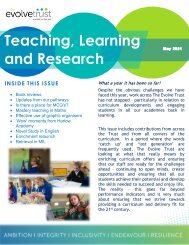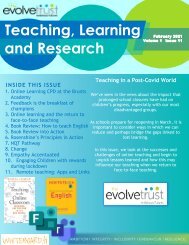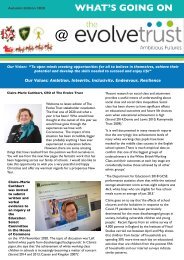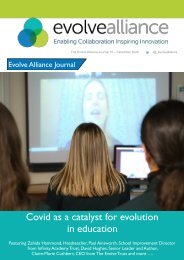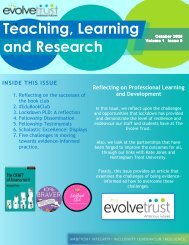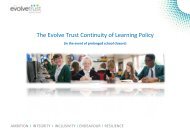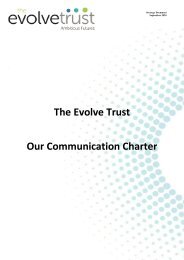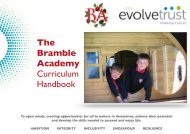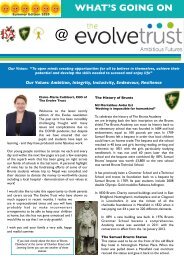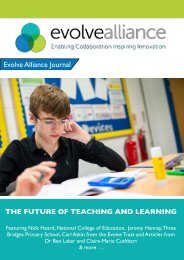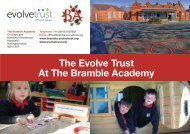Spring 2 Newsletter Publish - The Evolve Trust
Teaching and Learning Newsletter
Teaching and Learning Newsletter
Create successful ePaper yourself
Turn your PDF publications into a flip-book with our unique Google optimized e-Paper software.
Teaching, Learning
and Research
INSIDE THIS ISSUE
1. The coronavirus pandemic is
reshaping education
2. Using Technology across the
Trust
3. Seneca Champions League
4. Webinar PLD
5. Kate Jones’ Retrieval Practice
Book Review
6. Dare to Lead Book Review
7. An ethic of excellence
Book Review
8. Leaders with substance
Book Review
9. The Leaders Secret Code
Book Review
10. Books, Books, Books
11. Free PLD Opportunities
Distance Teaching and Learning
Schools across the UK closed their doors from Friday
March 20th. Consequently, teachers were faced
with the challenge of how to continue to support
their students’ education. Whilst a daunting task at
first, there have been several ways teachers have
used technology and resources already available to
support online learning and ensure students still
receive a quality education.
In this edition, we look we look at the discussion
around Distance Learning and look at the strategies
used by staff from across the Trust and beyond in
helping our young learners. We also look at
opportunities for staff to keep up to date with their
Professional Development, without leaving their
home.
The coronavirus pandemic is
reshaping education
By Jenny Anderson – Quartz Magazine
Page 2
Amidst the COVID-19 pandemic, staff and students are
making rapid changes to the way they teach and learn.
Critically, could this change the future of how we deliver as
educators and how our students learn? What
opportunities/barriers does distance learning throw up? To
answer some of these questions, I wanted the salient aspects
of Jenny Anderson’s (2020) article ‘The coronavirus pandemic
is reshaping education’.
To see this article online: https://qz.com/1826369/howcoronavirus-is-changing-education/
On Sunday, Feb. 23rd, rumors started that schools in the Lombardy region of Italy—the country’s
economic powerhouse—might close. Confirmed cases and deaths from the new coronavirus were
soaring. The healthcare system was teetering, and Italy had to dramatically change course in a bid to
halt the virus. By evening, the region was in lockdown.
Within 24 hours, Iain Sachdev, principal at the International School of Monza, had organized his teachers
and filmed a short video clip for students, faculty, and parents. School would open at 9am on Tuesday,
he said. Be patient, he implored. Taking a school online in 24 hours was a massive feat which would be
messy. Everyone would be learning.
Five weeks later, the school is still running—unfamiliar in many ways, identical in others. Teachers
teach via video conferencing every day. Kids participate using Padlet, a virtual post-it note system that
lets students share ideas; and Flipgrid, which lets teachers and students create short videos to share.
Students do individual work, group work, and confer with teachers when needed. Sachdev has
overhauled the schedule from 50-minute units to longer blocks. Teachers no longer use email, but
Microsoft Teams.
The International School of Monza is part of the world’s biggest educational technology (edtech)
experiment in history. With 1.5 billion students out of school and hundreds of millions attempting to
learn solely online, the experiment will reshape schools, the idea of education, and what learning looks
like in the 21st century. The pandemic is forcing educators, parents, and students to think critically,
problem-solve, be creative, communicate, collaborate and be agile. It is also revealing that there is
another way.
“It’s a great moment” for learning, says Andreas Schleicher, head of education at the OECD. “All the
red tape that keeps things away is gone and people are looking for solutions that in the past they did
not want to see,” he says. Students will take ownership over their learning, understanding more about
how they learn, what they like, and what support they need. They will personalize their learning, even
if the systems around them won’t. Schleicher believes that genie cannot be put back in the bottle.
“Real change takes place in deep crisis,” he says.
“You will not stop the momentum that will build.”
The coronavirus pandemic is
reshaping education
Page 3
But as tech connects people in their homes, its limitations for learning are on display for all the world
to see. The crisis has cast a bright light on deep inequalities not just in who has devices and
bandwidth, which are critically important, but also who has the skills to self-direct their learning, and
whose parents have the time to spend helping. It is a stark reminder of the critical importance of
school not just as a place of learning, but of socialization, care and coaching, of community and
shared space—not things tech has hacked too well.
The pandemic is giving tech massive insights at scale as to what human development and learning
looks like, allowing it to potentially shift from just content dissemination to augmenting relationships
with teachers, personalization, and independence. But the way it is has been rolled out—overnight,
with no training, and often not sufficient bandwidth—will leave many with a sour taste about the
whole exercise. Many people may well continue to associate e-learning with lockdowns, recalling
frustrations with trying to log on, or mucking through products that didn’t make sense.
“This may be a short-term commercial opportunity for some vendors, says Nick Kind, senior director
at Tyton Partners, an investment banking and strategy consulting firm focused on education. “But for
this to become transformational for teachers and learners, you wouldn’t have wanted to start this
way.”
When the storm of the pandemic passes, schools may be revolutionized by this experience. Or, they
may revert back to what they know. But the world in which they will exist—one marked by rising
unemployment and likely recession—will demand more. Education may be slow to change, but the
post-coronavirus economy will demand it.
Using Technology Across the
Trust
Page 4
Microsoft Teams has been an integral part of our software provision at the
Trust for several years and, since the school closure, we are seeing a huge
increase in its use to support student learning at home. It can even be used to
host meetings, using the Video Conferencing Function. Mr Lucas has used it to
host meetings with Senior Leadership and Mr Atkin is planning to host an
interactive video lesson with his Year 10s.
A massive thanks to Tony and Jayne Cartwright who have worked tirelessly to
get the Teams Year groups established as well as providing several guidance
packages on how to use different aspects of Teams, for students and staff.
Moreover, John Solly and Steph Dickinson have developed fantastic PowerPoints
on the use of Teams.
Weduc is an additional platform we use at the Trust.
It also helps keep parents up to date.
SENECA is an online platform that covers OCR, AQA, WJEC, Edexcel,
Eduqas, iGCSE as well as Key Stage 3 content. All the courses are exam
board specific and written by senior examiners & industry experts.
You can create multiple classes, invite your students via email or a
class code and set homework. Each assignment will show you
the student's grade, study time and number of attempts. Seneca
works with top neuroscientists to continuously improve the platform.
Research has found that students learn 2x faster using Seneca
compared to a revision guide. This ground breaking research involved
1,120 students and was published in the peer reviewed academic
journal IMPACT. Seneca also provide free CPD courses for teachers to
help apply these practices in the classroom.
This is a great platform which is free. The Trust has made a big push
with this, with Mr Morrin sending a guidance email to all staff on how
to use it to setup classes, assignments. In light of the school closures:
• 113,999 new students started learning on Seneca in the last 3
days.
• 6,438 teachers started using Seneca in the last 3 days.
• The 2,957,659th person signed up to use Seneca for free.
• The 18th March 2020 was Seneca's busiest day ever with over
300,000 people using the site for distance learning.
Seneca Champions League
Page 5
It’s official – The Brunts
Academy is the final round of
the Seneca Easter Champions
League!
Currently The Brunts Academy is
15 th place – let’s make sure we
aim for 1 st place. Winners to be
declared on 9 th April.
Every Tuesday, Mr Morrin will
send a Seneca Leaderboard to
highlight student engagement
with the platform.
Webinar PLD:
@teachertoolkit
By Hally Lockwood Page 6
@MissLockwood_PE
During the lockdown, I decided to book myself onto the online webinar on ‘Retrieval Practice’ last
Tuesday (24 th ). The webinar was run by Ross Morrison McGill (@TeacherToolkit).
The webinar discussed the meaning of retrieval practice bringing in the theories of Rosenshine (which
we had covered during school PLD), the issues with retrieval practice as well as outlining different ways
to use it in the classroom.
The webinar reminded me that the more information we give our students, the more important it is to
use retrieval practice regularly. In addition, it reminded me that there are so many different and
innovate ways to use retrieval practice to keep learning fun. I thoroughly enjoyed it.
I will definitely consider using the examples given such as using ‘Dual Coding plus retrieval’; giving
students verbal or written instructions and asking them to draw what they hear/read followed by giving
them further instructions to develop their drawing to recap prior learning. I would also like to trial using
a ‘curriculum plan’ where students get a 2x2 grid and as a plenary once a week they will write a response
in each box stating the following: what they learnt last month/last topic, last week, last lesson and
today.
Overall, I thought the webinar was interactive and engaging. I would recommend to anyone who wants
to revisit the importance of retrieval practice and grab some new ideas, all from the comfort of their
living rooms.
Kate Jones’ Retrieval Practice:
Book Review
By Sarah Turner
Page 7
Book Review – Kate Jones’ ‘Retrieval Practice’.
During my time off, I have been reading! This book in particular:
We have been hearing about retrieval practice from Natalie and Joe. It is one of Rosenshine’s
principles that we have been asked to consider using to guide our teaching practice.
‘Retrieval practice refers to the act of recalling learned information (with little or no support) and
every time that information is retrieved, or an answer is generated, it changes the original memory
to make it stronger’
There is evidence to show that retrieval practice aids recall as it moves information from the short
term memory to the long term. This ultimately benefits our students as they become more confident
in their learning and understanding of concepts.
In the staff resources folder, I’ve attached a powerpoint with a few examples of activities that can
be used in retrieval practice. You will have already seen challenge grids and the cops and robbers
activity. You will have seen a few of the others too, but hopefully there are a couple of new
activities that you won’t have seen. In this book, it mentioned that students soon get bored of the
same activity, hence why there are a few different ones.
Most of the activities are self-explanatory. The impact of the retrieval practice is maximised if
there is no, or very little, support. The activities are low-stakes for students. Students cannot fail
and can will be able to access the activities at different levels.
Hope they are useful! I have saved copies in: S:\Public Areas\AVP\retrieval practice
Retrieval practice placemat:
Generic so convenient and requires minimal effort to set up. Promotes verbal discussions between
students, retrieving info.
Picture prompt:
Use of pictures to prompt recalling knowledge. May need to model the information that you want
the students to include. Eg, on the ppt are pictures of separating techniques. Depending on the
class, students could name them, right through to explaining how each technique works
Cops and Robbers:
Set a question. Students have a minute to write what they know (cops column), then have a couple
of minutes to speak with their peers to get more info
Kate Jones’ Retrieval Practice:
Book Review
By Sarah Turner
Page 8
Walkabout Bingo (find someone who):
Encourages students speaking with one another. They can only get one answer per student
Retrieval Relay Race:
Students work in groups, the first writes down what they know in answer to a question or about a topic
etc. The 2 nd student adds to the info, then the 3 rd etc
Challenge/Retrieval grids:
Students pick questions to answer within a given time
Checklists:
A teacher who has shared these in the book uses them as follows…
Students are given the checklist at the start of a new topic. They are made up of numbered statements
linked to the spec. At the start of a lesson, students are asked to find the number on the
checklist. Students can tick this off when they have mastered sections. If absent, students can see
what they have missed. They can be used for revision at the end of the topic.
A to Z:
Students complete an A to Z list with topic keywords. They could add pictures/definitions
Retrieval Roulette:
Uses a spreadsheet that randomly selects a set of questions for students to answer. The questions could
be from any topic. I have found 3 examples – yr8 activate 2 topics, gcse chem, gcse physics. They are
saved in the folder
Multiple choice quiz:
Students answer questions in a given time
‘Dare To Lead’ Brené Brown
Book Review
By Joe Morrin
Page 9
‘Dare to Lead’ by Brené Brown
Whilst restocking the library with books from the Headship Institute, I came by Brené Brown’s ‘Dare to
Lead’ which caught my eye. At first glance, the book appeared to be very much centred on corporate
leadership, but as I read further, Brené’s no-nonsense, direct approach to her writing made this a
thoroughly enjoyable read. I started this book with the intent of learning ways to be a better leader and
to embrace being able to ‘rumble with vulnerability: a discussion, conversation, or meeting defined by
a commitment to lean into vulnerability, to stay curious and generous, to stick with the messy middle of
problem identification and solving, to take a break and circle back when necessary, to be fearless in
owning our parts and to listen with the same passion with which we want to be heard (Brown, 2018).
Throughout the book, I found her writing could be applied to everyday life; as a spouse, parent, colleague
and close friend.
Brené’s leadership experience; her ability to draw upon empirical research to substantiate claims made,
and the ability to tell the hardened-truth is what makes this an extremely powerful book for anyone. In
essence, the book provides insight into the reasons why, as leaders, we tend to negate our vulnerabilities
in the workplace and the skills we need to focus on to become more daring leaders. Ultimately, how do
we become courageous, bold, creative, daring leaders at work? What does it mean for us to begin a
process of healing from past hurts, growing through our insecurities and shortcomings, and stepping into
the ‘arena’ every single day? How do we break-down the armour that surrounds us? As you go through
the book, she goes on to discuss ways to live into your values, braving trust, and learning to rise.
My favourite quote which resonated with me:
“Living into our values means that we do more than profess our values, we practice them. We walk our
talk – we are clear about what we believe and hold important, and we take care that our intentions,
words, thoughts, and behaviours align with those beliefs.” (Brown, 2018, p186)
Brené’s book is also narrated by and is available on Amazon’s Audible, for times when reading is more
challenging. Moreover, Brené has hosted numerous TED talks on vulnerability and shame.
I wholeheartedly recommend this book for staff at every level! It is relevant, powerful, and very candid.
Ron Berger’s ‘An Ethic of
Excellence’ Book Review
By Natalie Aveyard
Page 10
‘An Ethic of Excellence’ Ron Berger
A short read that is bursting with the author’s passion, enthusiasm and real
desire to ensure his students have pride in everything they do. I smiled so
many times throughout the book at his genuine warm stories as he recanted
tale after tale of students showcasing examples of them taking pride in doing
their best.
Ron Berger is an American teacher with a wealth of experience who has been teaching for 25 years as
well as being a carpenter. I found this to be a key fact about Ron as I really think when we are reading
educational books it is important that they are written by teachers for teachers.
I was sceptical at first just with the title alone ‘An Ethic of Excellence’ as I very naively thought it would
just focus on securing neat work in pupils’ books, however this is a book which clearly outlines that we
need to strive for excellence in everything we do. Ron explains that staff and students should be
motivated together about quality. To become excited about doing a good job. To establish such an ethic
is a long term commitment – it’s a way of life. That our concern as educators should be centred on “what
we can do in our schools and communities to bring out the best in kids.” It has a real link to us demanding
excellence and the work we have started with this, in the fact that the ethic becomes a norm, it is what
our students know.
The book is broken down into 4 chapters with the first taking the role of setting the scene for excellence
with Ron sharing his vision with sub sections on evidence in the work, in the students and a library of
excellence. The next 3 chapters take it in turn to explain each of Ron’s toolboxes for excellence; a school
culture of excellence, work of excellence and teaching of excellence.
My favourite chapter looked at ensuring students gain self-esteem from accomplishments, not
compliments; “We can’t first build the students’ self-esteem and then focus on their work. It is through
their own work that their self-esteem will grow.” Ron also takes the time in this chapter to outline the
importance of models and showing students work of quality. The role that models have in inspiring
students as well as creating a focus for discussion around the strengths and weaknesses. Schools,
corridors and classrooms need to be filled with attractive displays of high-quality student work – original
work, not just commercial worksheets – and good literature or academic subject appropriate reading.
This carefully links to the idea he raises that students need to know from the outset that quality mean
rethinking, reworking and polishing – this made me think back to the Austin butterfly video we have all
seen. Furthermore on an individual pupil level their work goes through many drafts and isn’t considered
complete until it represents high-quality work for that child.
The book emphasises the need to give students a reason to care, that they know their work is important.
An ‘ethic of excellence’ is a culture, an approach, a way of thinking!
Matthew Evan’s ‘Leaders with
substance’ Book Review
By Nigel Caunt
Page 11
‘Leaders with substance’ by Matthew Evans
This book is an outstanding work based around leadership in today’s modern educational landscape,
which is increasingly becoming an important issue. Strong, effective leadership is underpinned by
trust and leaders who have substance. This book is exceptional in highlighting the key aspects
required when thinking about this, and how important leadership is in a time of opportunity within
the educational sector.
The opening of the book starts with what leadership even means and ‘is leadership even a thing’. In
this chapter, Matthew Evans discusses the findings from a Lieutenant Colonel who published a paper
titled ‘there is no such thing as leadership’. This is synonymous with the underpinning premise of this
book which hopes to explore the multi-faceted issues around leadership within contemporary schools.
From the start to the finish this book does not waste your time (which is all too precious in today’s
education and is a highly prized commodity). It gives you the fundamentals of years of experience
and research in a highly readable form, giving clear cut, succinct and practical case studies of how
you can apply the thinking to your own setting.
The book acknowledges how complex the world of leadership is in education today having to not only
manage a school, but equally the community in which you serve in equal measure, and the
problematic issues that can arise with this. When reading through many of the different chapters,
you will feel like you could have written this book yourself thanks to its ‘to the point’ approach. From
one chapter to the next he applies leadership theory to the plethora of experiences he has clearly
accumulated over his many years, and this all pushes towards a recognition of the importance of
values driven visionary leadership within all our educational settings. This is truly a ‘must read’ for
anyone aspiring to leadership in (or anywhere) in education.
Mill’s et. al’s ‘The Leaders
Secret Code’ Book Review
By Carl Atkin
Page 12
‘The leader’s Secret Code’ – Mills et. al.
The Trust Executive Team has been heavily engrossed in their new core text
this term – The Leader’s Secret Code. This book has been co-written with Dr
Ben Laker who has visited the Trust on multiple occasions and worked with
groups of leaders to challenge their thinking and to provide an alternative
approach to their leadership.
The book highlights how leadership has changed in the last decade, highlighting that all certainties
have now disappeared – mostly washed away by connectivity, whilst acknowledging that the internet
comes with risks and possibilities.
One thing that recent events has definitely highlighted for anyone who was in doubt, is that change is
the new constant and it is massively important that the rate of change on the inside of an organisation
needs to exceed that of change externally – “If the rate of change on the outside exceeds the rate of
change on the inside then the end is near”. The book warns of those who “hoard knowledge” as a
danger to an organisation, as well as the importance of 20th century leaders balancing control and
direct leadership with the democratization of leadership – consultation and involvement/partnership
and delegation. That said, great leaders know when to use directive leadership – mostly in times of
change or challenge!
Several close up interviews with some of the best leaders across the world (Iconics) show that great
leaders are made in tough times with the ability to navigate through those times boldly and
aggressively - “Instead of cowering in indecision, they react boldly and aggressively”. This avoids
people being under sustained pressure for long periods whilst becoming frustrated and wary.
The book recognises that leadership is a journey and is a process of helping one and all advance toward
a destination. And, as you might expect, it starts with oneself. The text helps you consider what your
‘journey motivators’ are – the ‘why’ we do things and why we respond to some journey motivators
more than others, ultimately determining our destination. Through its study of the highest performing
sales people, it recognises that the highest performers all shared the same journey motivators – so did
the lower performers!
Role modelling is important as it determines a leader’s credibility, reputation and the respect you have
from those around you. Leaders have emotionally held, deeply rooted opinions that we assume to be
fact which provide motivation to deploy certain talents or skills – these are beliefs, which can change
over time. Through an in-depth study of leadership, the book shows that the 7 key terms which
emerged as descriptors of destination beliefs include fulfilment, strategy, communication, influence,
control, resilience and empowerment.
Whilst only part way through this text, it is already clear that this book is for anyone involved in leading
a team in their organisation, who wants to learn the secrets of successful leadership. Based on
interviews and analyses (qualitative and quantitative) with some of the world's best performing leaders,
across a mix of industries, cultures and context, the authors present a rigorous evaluation of how
leaders behave and how they are driven. In doing so, they reveal the secret code behind consistent and
high-level success in leadership and management in any organisation!
Books, books, books
Page 13
Free PLD Opportunities
Page 14
How To Teach Online: Providing Continuity for Students
Link: https://www.futurelearn.com/courses/teach-online
As the coronavirus pandemic spreads, there has been an increasing move towards teaching online as
schools and universities shut.
Even for experienced practitioners, this situation presents challenges. However, with the right
knowledge, you can overcome the hurdles presented by teaching online and embrace its possibilities.
On this course, you’ll be given practical steps towards online teaching and student support. You can
reflect on your own work, adapt your approaches, and share your stories with a global community of
educators who’ll help you to get started and keep going in uncertain times.
Take your teaching online
Link: https://www.open.edu/openlearn/education-development/education/take-your-teachingonline/content-section-overview?active-tab=description-tab
Over the weekend of the 4th and 5th April, educators from around the world will be posting a video
presentation on this page, for you to watch – a great CPD opportunity during this period of lockdown.
This event is completely free, but you might want to donate to our brilliant NHS.
Seneca Teacher PLD
Did you know Seneca offers
Free Certified PLD for
Teachers? The leadership for
Teachers draws upon Sam
Stickland’s most recent book.
An absolute must.
Use this link:
https://app.senecalearning.
com/dashboard/courses/add
?Price=Free&Age+Group=Tea
cher+CPD
Free PLD Opportunities
Page 15
Free PLD opportunities to keep you going- Take your pick & keep a record
of what you complete, including certificates!
Pastoral
/wellbeing
Course title
02_01 Emotional Health and Wellbeing
02_02 Risk Factors and Early Warning Signs
02_03 Mental Health and Mental Illness in
Children
Teaching students who have suffered
complex trauma
We all have mental health: an
introduction for teachers
Child protection for teachers
Making sense of mental health
problems
Keeping them safe
Young people and their mental health
ACEs: Introduction to Adverse
Childhood Experiences & Early Trauma
Professional relationships with young
people
Recognising and preventing FGM
Emotional intelligence at work
Understanding young minds
Safeguarding – child sexual abuse and
exploitation
Introduction to child psychology
Get moving, get healthy
Bullying in schools
Understanding depression and low
mood in young people
Links
https://www.minded.org.uk/login
https://www.futurelearn.com/courses/te
aching-students-trauma
https://www.samh.org.uk/about-mentalhealth/elearning-for-teachers
https://www.futurelearn.com/courses/chi
ld-protection-teachers
https://www.open.edu/openlearn/healthsports-psychology/making-sense-mentalhealth-problems/content-section-0?activetab=description-tab
https://paceuk.info/training/keep-themsafe/
https://www.futurelearn.com/courses/yo
ung-people-mental-health
https://www.acesonlinelearning.com/
https://www.open.edu/openlearn/healthsports-psychology/professionalrelationships-young-people/contentsection-0?active-tab=description-tab
https://www.virtualcollege.co.uk/resources/freecourses/recognising-and-preventing-fgm
https://www.futurelearn.com/courses/em
otional-intelligence-at-work
https://www.virtualcollege.co.uk/courses/safeguarding/under
standing-young-minds
https://learning.seenandheard.org.uk/
https://www.open.edu/openlearn/educati
on-development/childhoodyouth/introduction-childpsychology/content-section-0?activetab=description-tab
https://www.virtualcollege.co.uk/courses/health-andsafety/get-moving-get-healthy
https://www.futurelearn.com/courses/pe
er-bullying
https://www.futurelearn.com/courses/de
pression-young-people
SEN Introducing British Sign Language https://www.british-sign.co.uk/learnonline-british-sign-language-course/
Disability matters learning packages https://www.disabilitymatters.org.uk/Cat
alogue/TileView
Understanding dyslexia
https://www.open.edu/openlearn/educati
ondevelopment/education/understandingdyslexia/content-section-0?activetab=description-tab
Understanding Autism
https://www.open.edu/openlearn/science
-maths-technology/understandingautism/content-section-overview?activetab=description-tab
Dyslexia awareness part 1
https://education.microsoft.com/enus/course/30a7b5e8/overview
Dyslexia awareness part 2
https://education.microsoft.com/enus/course/4acb190d/overview
Focus on SEN CPD
https://nasen.org.uk/training-andcpd/online-learning/learning.html
Ed Tech Education technology leadership in https://www.futurelearn.com/courses/ed
schools
ucation-technology-leadership-in-schools
Take your teaching online
https://www.open.edu/openlearn/educati
on-development/education/take-yourteaching-online/content-sectionoverview?active-tab=description-tab
Impact of technology
https://www.futurelearn.com/courses/im
pact-of-technology
Accessibility of e-learning
https://www.open.edu/openlearn/educati
on-development/educationcareers/accessibility-elearning/contentsection-0?active-tab=description-tab
The online educator: people and
https://www.futurelearn.com/courses/th
pedagogy
e-online-educator
Understanding technology in evidencebased
teaching and learning
hnology-teaching-learning
https://www.futurelearn.com/courses/tec
The Arts Becoming a better music teacher https://www.futurelearn.com/courses/be
coming-a-better-music-teacher
Why teach art?
https://www.open.edu/openlearn/educati
on/why-teach-art/content-section-
0?active-tab=description-tab
Literacy Introduction to teaching vocabulary https://www.futurelearn.com/courses/de
across the
veloping-vocabulary
curriculum
Introduction to speech, language and
communication
English grammar in context
Building literacy with PowerPoint
Understanding language: learning and
teaching
Understanding language and learning
https://www.topsypage.com/blog/2019/8
/2/communication-trustcourse?rq=Communication
https://www.open.edu/openlearn/educati
on-development/education/english-
grammar-context/content-section-
0?active-tab=description-tab
https://education.microsoft.com/enus/course/bc04fe50/overview
https://www.futurelearn.com/courses/un
derstanding-language
https://www.open.edu/openlearn/langua
ges/understanding-language-andlearning/content-section-0?activetab=description-tab
RE Muslims and Islam https://mailchi.mp/pewresearch.org/musl
ims-and-islam-course
Politics and society
https://www.futurelearn.com/subjects/politic
s-and-society-courses/religion
Research Engaging with educational research https://www.open.edu/openlearn/educati
on-development/education/engaging-
educational-research/content-section-
0?active-tab=description-tab
Education research that matters
https://www.futurelearn.com/courses/wa
ys-of-researching
Cognitive science for teachers level 1 https://app.senecalearning.com/classroo
m/course/9f6bf15c-23fe-401c-810a-
3bc66d761885
Cognitive science for teachers level 2 https://app.senecalearning.com/classroo
m/course/aebdbb79-c863-4eca-ab3f-
31e5120f5fb0
Metacognition for teachers
https://app.senecalearning.com/classroo
m/course/d1277cd6-7205-4511-8d95-
1f1ed341ae69
Dual coding for teachers
https://app.senecalearning.com/classroo
m/course/9375f141-2704-49d8-a754-
e142c7aad967/section/3ed336fc-89f0-
4dba-b853-4c9f61a0d3ed/section-overview
Rosenshine masterclass with Tom https://teacherhead.com/2020/03/16/ros
Sherrington
enshine-masterclass-captured-free-cpd/
Muslims and Islam
https://mailchi.mp/pewresearch.org/musl
ims-and-islam-course
Politics and society
https://www.futurelearn.com/subjects/politic
s-and-society-courses/religion
Engaging with educational research https://www.open.edu/openlearn/educati
on-development/education/engaging-
educational-research/content-section-
0?active-tab=description-tab
Teaching
and
learning
Teaching for good behaviour
Planning for learning: formative
assessment
Inclusive education
Mentoring student teachers
Introduction to GDPR
Facilitating learning in practice
Teaching sustainable development
goals
https://www.open.edu/openlearn/educati
on-development/educationcareers/teaching-good-behaviour/contentsection-0?active-tab=description-tab
https://www.futurelearn.com/courses/pla
nning-for-learning
https://www.futurelearn.com/courses/inc
lusive-education
https://www.open.edu/openlearn/educati
on-development/learning-teachmentoring-and-tutoring-studentteachers/content-section-0?activetab=description-tab
https://www.virtualcollege.co.uk/courses/compliance/introdu
ction-to-gdpr
https://www.open.edu/openlearn/healthsports-psychology/facilitating-learningpractice/content-section-overview?activetab=description-tab
https://education.microsoft.com/enus/course/72e17f8d/overview
Leadership
Supporting successful learning in
secondary school
Evaluating school classroom discussion
Making Best Use of Teaching Assistants
Embedding employability skills in the
curriculum
Transforming education in challenging
environments
Teaching and learning tricky topics
Education for all: disability, diversity
and inclusion
Differentiation for learning
The science of learning
Meeting the needs of diverse learners
Assessment for teachers
Leading blended professional learning
Looking globally: the future of
education
Climate Change teacher free courses
The what and why of educational
leadership and management
Leadership and context
Introduction to Cloud for leaders
Exploring educational leadership
Inspiring social change leaders
Free trial membership to Leadership
Matters
Virtual leadership workshops
https://www.futurelearn.com/courses/su
pporting-learning-secondary
https://www.open.edu/openlearn/educati
on/educational-technology-andpractice/educational-practice/evaluatingschool-classroom-discussion/contentsection-0?active-tab=description-tab
https://www.tes.com/mycourses/courses/
making-best-use-of-teaching-assistantscopy-872
https://www.tes.com/institute/embeddin
g-employability-skills-CPD
https://www.futurelearn.com/courses/tra
nsforming-education
https://www.open.edu/openlearn/educati
on-development/learning/teaching-andlearning-tricky-topics/content-sectionoverview?active-tab=description-tab
https://www.futurelearn.com/courses/ed
ucation-for-all
https://www.futurelearn.com/courses/dif
ferentiating-for-learning-stem
https://www.futurelearn.com/courses/sci
ence-of-learning
https://education.microsoft.com/enus/course/a41ac17d/overview
https://app.senecalearning.com/classroo
m/course/04e36b88-c9c6-47ac-8a4b-
54b9ceeea532
https://education.microsoft.com/enus/course/38ba2124/overview
https://www.open.edu/openlearn/educati
on-development/looking-globally-thefuture-education/content-sectionoverview?active-tab=description-tab
https://unccelearn.org/educcate/
https://www.open.edu/openlearn/educati
on-development/education-careers/thewhy-and-what-educational-leadership-andmanagement/content-section-0?activetab=description-tab
https://www.open.edu/openlearn/educati
on-development/leadership-andcontext/content-section-0?activetab=description-tab
https://education.microsoft.com/enus/course/46b3faaa/overview
https://www.open.edu/openlearn/educati
on-development/exploring-educationalleadership/content-section-0?activetab=description-tab
https://education.microsoft.com/enus/course/d96ad722/overview
https://access.leadershipmatters.org.uk/
Email office@enhancinglearning.co.uk to
join
Early
career
teachers
Becoming a reflective practitioner
Learning to teach: an introduction to
classroom research
Learning to teach: making sense of
learning to teach
Professional development for early
career teachers
https://www.open.edu/openlearn/educati
on-development/learning-teach-becoming-
reflective-practitioner/content-section-
0?active-tab=description-tab
https://www.open.edu/openlearn/educati
on-development/learning-teachintroduction-classroom-research/contentsection-0?active-tab=description-tab
https://www.open.edu/openlearn/educati
on-development/learning-teach-making-
sense-learning-teach/content-section-
0?active-tab=description-tab
https://www.futurelearn.com/courses/ear
ly-career-teachers




